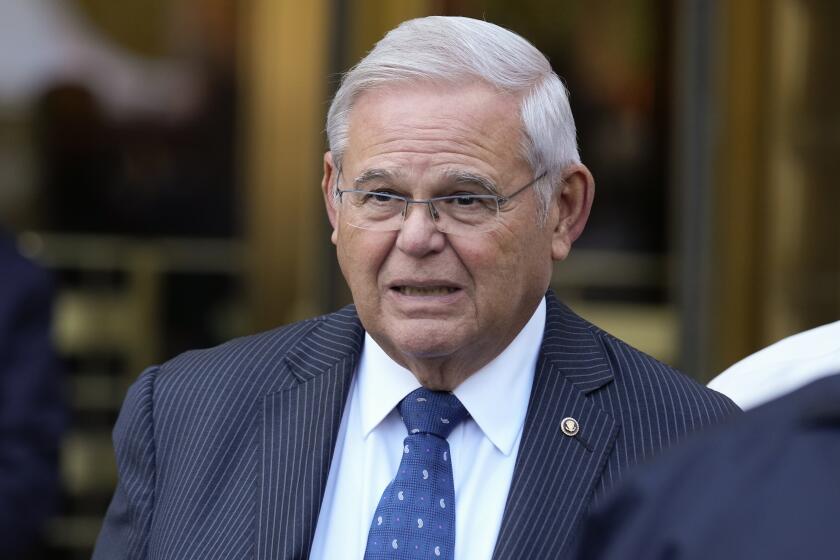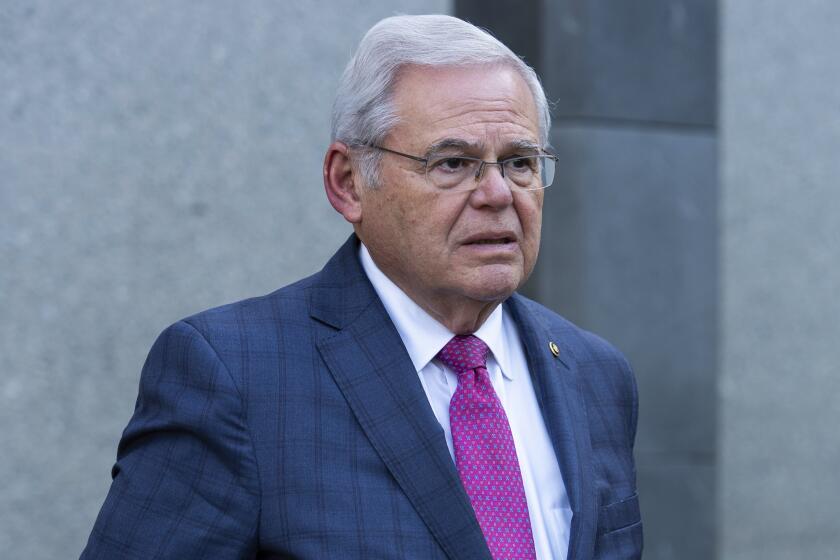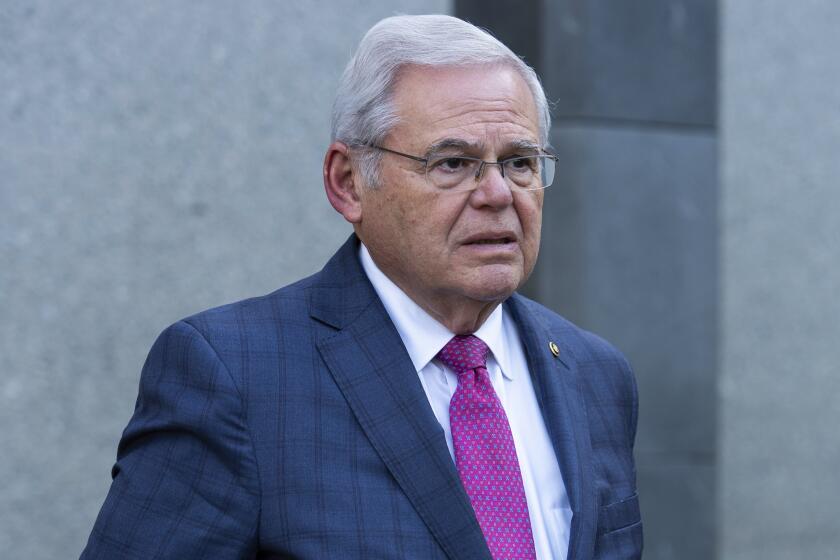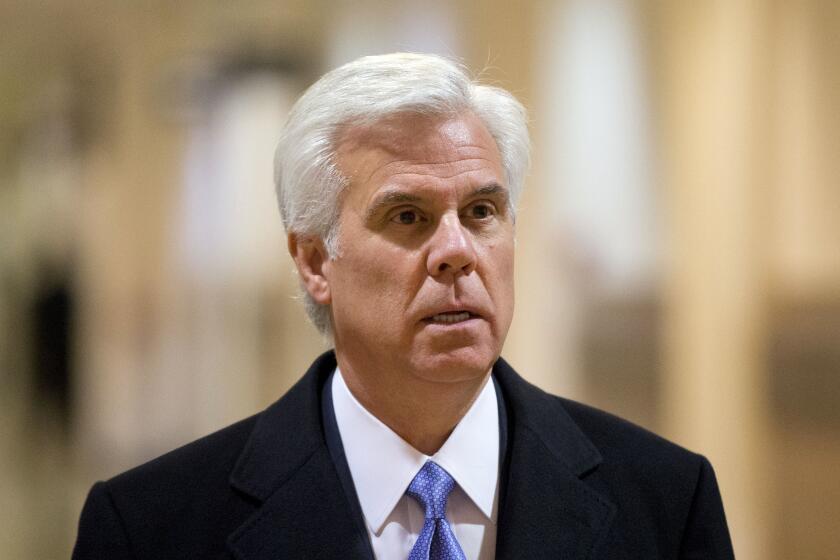Sen. Menendez guilty of taking bribes in cash and gold and acting as Egypt’s foreign agent

NEW YORK — U.S. Sen. Robert Menendez was convicted of all charges at his corruption trial Tuesday, including accepting bribes of gold and cash from three New Jersey businessmen and acting as a foreign agent for the Egyptian government.
Prosecutors said the Democrat abused the power of his office to protect allies from criminal investigations and enrich associates, including his wife, through acts that included meeting with Egyptian intelligence officials and softening his position toward that country as he speeded its access to millions of dollars in U.S. military aid.
Menendez, 70, looked toward the jury at times and appeared to mark a document in front of him as the verdict was read. Afterward, he sat resting his chin against his closed hands, elbows on the table. He and his lawyers vowed to appeal as they left the courthouse.
“I have never violated my public oath. I have never been anything but a patriot of my country and for my country. I have never, ever been a foreign agent,” Menendez said before a collection of microphones outside the courthouse before walking briskly to a waiting car.
For the second time in a decade, Sen. Bob Menendez is finding his political career and freedom on the line in a federal criminal case.
Menendez did not testify at the nine-week trial but insisted publicly he was only doing his job as chairman of the Senate Foreign Relations Committee. He said gold bars found in his New Jersey home by the FBI belonged to his wife, Nadine Menendez. She too was charged but her trial was postponed so she could recover from breast cancer surgery. She has pleaded not guilty.
The verdict comes four months before Election Day and potentially dooms Menendez’s chances of winning reelection as an independent.
The trial’s outcome prompted a chorus of Democrats to call on Menendez to resign, including Senate Majority Leader Chuck Schumer, New Jersey’s junior senator, Corey Booker, and the party’s nominee to replace Menendez, Rep. Andy Kim.
“In light of this guilty verdict, Senator Menendez must now do what is right for his constituents, the Senate, and our country, and resign,” Schumer’s statement said.
New Jersey Gov. Phil Murphy, who would appoint Menendez’s replacement, urged the Senate to expel him if he doesn’t resign. It’s not clear whether Schumer would be willing to hold those votes. Expulsion requires a two-thirds majority. A senator has not been removed from office in over a century.
A New Jersey businessman testified that he bribed Sen. Bob Menendez, asking him to make criminal probes of his friends and family vanish.
Curtis Bashaw, the Republican candidate for the seat, also called on Menendez to quit, saying New Jersey deserves better than “corruption and made-for-TV political scandals, courtesy of Bob Menendez and the Democratic machine.”
The Senate Ethics Committee, meanwhile, will complete its own investigation of Menendez “promptly” and consider a “full range of disciplinary actions,” according to a statement from Democrat Chris Coons and Republican James Lankford, the committee’s chairman and vice chairman. The probe adds further pressure on Menendez to voluntarily resign.
Menendez faces the possibility of decades in prison when he is sentenced on Oct. 29. He was found guilty of 16 counts.
This was the second corruption trial for Menendez. An earlier prosecution on unrelated charges in 2017 ended with a deadlocked jury.
“This case has always been about shocking levels of corruption, hundreds of thousands of dollars in bribes in the form of cash, gold bars, a Mercedes-Benz. This wasn’t politics as usual, this was politics for profit. And now that a jury has convicted Bob Menendez, his years of selling his office to the highest bidder have finally come to an end,” U.S. Attorney Damian Williams said outside the courthouse shortly before Menendez emerged.
U.S. Sen. Robert Menendez of New Jersey has filed to run for reelection as an independent even as he is on trial on federal bribery charges.
Two co-defendants also were convicted. The New Jersey businessmen, Wael Hana and Fred Daibes, were accused of paying bribes. A third businessman, Jose Uribe, pleaded guilty prior to trial and testified against the others.
Hana’s lawyer, Lawrence Lustberg, said outside the courthouse that they would file motions to set aside the verdict. The American system of justice “has, in his view, let him down,” Lustberg said of his client. Daibes’ lawyer, Cesar De Castro, also promised an appeal, saying, “We are extraordinarily disappointed. ... We think the result was wrong.”
The jury’s decision followed a lengthy probe that included a June 2022 FBI raid on the Menendezes’ home in Englewood Cliffs, N.J., a wealthy community just across the Hudson River from New York City. FBI agents seized gold bars worth nearly $150,000 and cash, mostly in stacks of $100 bills, totaling more than $480,000. In the garage was a Mercedes-Benz convertible. A supervising agent testified that stacks of cash were stuffed in boots, shoeboxes and jackets belonging to the senator.
Prosecutors argued that the gold bars, cash and car were bribes. Defense lawyers disputed that, arguing that the gold belonged to his wife and she had kept him in the dark about financial troubles so grim that she nearly lost the home to foreclosure. They said the senator habitually hoarded money because his parents escaped Cuba in 1951 with only the cash they had hidden in a grandfather clock.
Sen. Bob Menendez’s bribery trial is on a weeklong break after Manhattan federal court jurors got stuck in an elevator.
More shocking, though, were allegations that Menendez had earned some of the money by using his powerful perch on the Senate Foreign Relations Committee to benefit Egypt, an important U.S. ally but one often subject to American criticism over alleged human rights abuses.
Prosecutors said Nadine Menendez held herself out as a conduit to her powerful husband, exchanging texts with an Egyptian general and helping to arrange a Washington visit by the chief of Egypt’s intelligence service. To one general she texted, “Anytime you need anything you have my number and we will make everything happen.”
Sen. Menendez, prosecutors said, took actions to ingratiate himself with Egyptian officials, including providing them with information about the staff at the U.S. Embassy in Cairo and ghostwriting a letter to fellow senators encouraging them to lift a hold on $300 million in military aid. The senator also told his wife to let her Egyptian contacts know he planned to sign off on $99 million in tank ammunition.
New Jersey businessman and former Democratic National Committee member George Norcross charged with racketeering and other charges.
Charges, originally announced last September, were expanded over time, eventually including bribery, extortion, fraud, obstruction of justice, conspiracy and, for Menendez, acting as a foreign agent of Egypt.
Prosecutors said serial numbers on the gold bars and fingerprints on tape that bound together the stacks of cash were traced to Hana and Daibes. Some fingerprints on the tape, they said, belonged to Menendez. And in return, prosecutors said, Menendez took numerous actions to benefit the businessmen.
Those included protecting Egypt’s decision to award Hana a lucrative monopoly to certify that meat sent to Egypt met Islamic dietary requirements. Menendez asked a U.S. agriculture official to drop his opposition to the monopoly deal despite concerns that it would drive up prices.
Uribe testified at the trial that he paid for Nadine Menendez to get a Mercedes-Benz convertible in exchange for the senator’s help assuring that his insurance business would not be affected by New Jersey criminal probes of a trucking company belonging to his friend.
Prosecutors also said Sen. Menendez attempted to interfere in a federal criminal prosecution of Daibes, a politically influential real estate developer accused of bank fraud. The U.S. attorney for New Jersey, Philip Sellinger, testified at the trial that Menendez questioned him about the Daibes prosecution and said he believed he was “being treated unfairly.”
Sen. Robert Menendez is skipping New Jersey’s Democratic primary while he fights federal corruption charges, but he’s open to an independent run for Senate if exonerated.
Prosecutors also presented evidence that Menendez took actions favorable to Qatar’s government to help Daibes secure a multimillion-dollar deal with a Qatari investment fund.
Menendez’s political career began in 1974 when, only two years out of high school, he was elected to the education board in Union City, N.J. He later served in the state legislature, then was elected to the U.S. House in 1992. He became a U.S. senator in 2006.
Menendez had the dubious distinction of being the only U.S. senator indicted twice.
In 2015, he was charged with letting a wealthy Florida eye doctor buy his influence through luxury vacations and campaign contributions. After a jury couldn’t reach a unanimous verdict in 2017, New Jersey federal prosecutors dropped the case rather than put Menendez on trial again.
Voters accepted the mistrial as an exoneration and returned Menendez to the Senate.
After his second indictment last summer, Menendez claimed he was being persecuted, saying some people “cannot accept that a first-generation Latino American from humble beginnings could rise to be a U.S. senator.”
Neumeister and Marcelo write for the Associated Press.
More to Read
Sign up for Essential California
The most important California stories and recommendations in your inbox every morning.
You may occasionally receive promotional content from the Los Angeles Times.
















